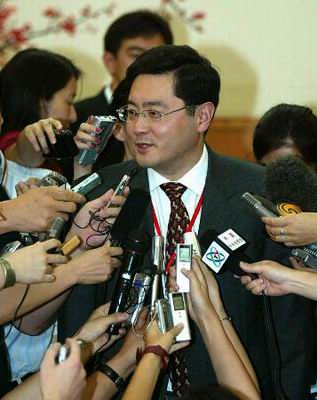
The common document is not a parameter to judge whether
the talks are successful or not, said Qin Gang, spokesman for the Chinese
delegation, yesterday. (Photo: sina.com)
Negotiators in the Korean nuclear talks will meet for an 11th day
today after failure to reach consensus on a statement of principles.
"There
remain differences, and some are quite outstanding," Qin Gang, spokesman for the
Chinese delegation, told reporters last night in Beijing.
But, he added,
"there is no sign of a breakdown in the talks."
Kim Kye-gwan, DPRK's chief
negotiator, said last night that the Democratic People's Republic of Korea
should enjoy the right to the peaceful use of nuclear power.
Kim expressed
dissatisfaction with the United States' opposition to the DPRK's peaceful use of
nuclear power.
"All countries in the world enjoy the right to make a peaceful
use of nuclear power," Kim said. "The DPRK is neither a defeated nation in a war
nor a nation having committed any crimes, so why should we not be allowed to use
the nuclear power peacefully?"
He said now all participating nations in the
six-party talks except the United States understand the position of the DPRK. He
also expressed his belief that the United States would also be persuaded in the
end to support the DPRK to make a peaceful use of nuclear power.
According to
Kim, as differences remained in the political stances of the DPRK and the United
States, the current round of talks is now in sort of stalemate in the drafting
process of a common document.
He said so far various parties to the talks
have failed to reach a consensus on specific measures relating to the
denuclearization of the Korean Peninsula, adding that the DPRK and the US are
still unable to establish mutual trust on the normalization of bilateral
ties.
The Chinese delegation spokesman said, "All parties need to demonstrate
flexibility and make more effort."
The six parties - the United States, the
DPRK, South Korea, China, Russia and Japan - have deepened mutual understanding
during the discussions, and that was "the biggest achievement" of the
fourth-round of talks, the spokesman said.
The negotiators exchanged views on
key issues, "which itself is progress," he said.
He stressed that it was not
China's role to decide whether the talks would come to an end.
The spokesman
did not disclose the contents of a draft statement of principles on nuclear
disarmament proposed by the Chinese delegation, which has been under discussion
for several days.
"The common document is not a parameter to judge whether
the talks are successful or not," Qin said. "The six-party talks are a process,
and there is a long way to go to realize the denulcearization of the Korean
Peninsula, which requires unremitting efforts."
"We must be neither too
optimistic nor too pessimistic," he said.
The six parties have held 72
bilateral consultations since the current round of talks started on July 26,
exceeding the total number of bilateral meetings held during the previous three
rounds.
North Korea and the United States reportedly held eight one-on-one
meetings over the past 10 days.
All sides are striving to forge a common
document setting forth basic principles for resolving Korean nuclear
issues.
"We really need clarity on the principles," US chief negotiator
Christopher Hill said. "It is precisely the clarity that we are seeking. That is
so
necessary."



